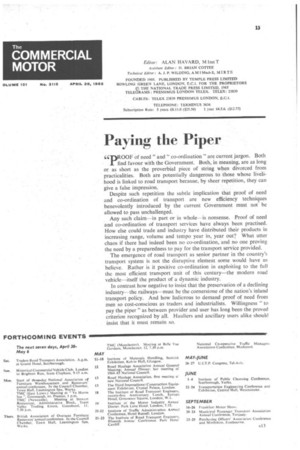Paying the Piper
Page 15

If you've noticed an error in this article please click here to report it so we can fix it.
CCEIROOF of need " and " co-ordination " are current jargon. Both r find favour with the Government. Both, in meaning, are as long or as short as the proverbial piece of string when divorced from practicalities. Both are potentially dangerous to those whose livelihood is linked to road transport because, by sheer repetition, they can give a false impression.
Despite such repetition the subtle implication that proof of need and co-ordination of transport are new efficiency techniques benevolently introduced by the current Government must not be allowed to pass unchallenged.
Any such claim in part or in whole—is nonsense. Proof of need and co-ordination of transport services have always been practised. How else could trade and industry have distributed their products in increasing range, volume and tempo year in, year out? What utter chaos if there had indeed been no co-ordination, and no one proving the need by a preparedness to pay for the transport service provided.
The emergence of road transport as senior partner in the country's transport system is not the disruptive element some would have us believe. Rather is it positive co-ordination in exploiting to the full the most efficient transport unit of this century—the modern road vehicle—itself the product of a dynamic industry.
In contrast how negative to insist that the preservation of a declining industry---the railways—must be the cornerstone of the nation's inland transport policy. And how ludicrous to demand proof of need from men so cost-conscious as traders and industrialists. Willingness "to pay the piper" as between provider and user has long been the proved criterion recognized by all. Hauliers and ancillary users alike should insist that it must remain so.




































































































